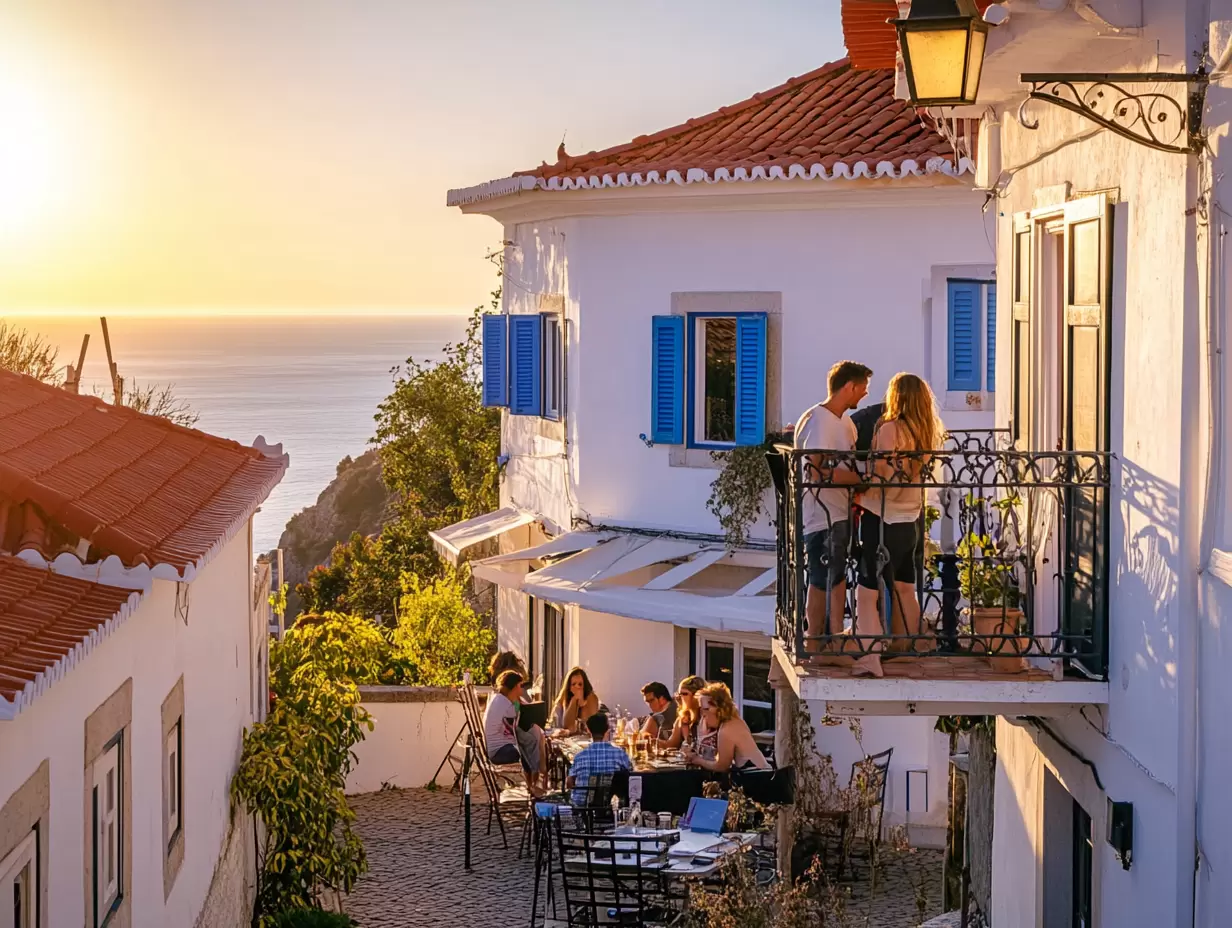
Ever wondered what red tape awaits you in Portugal, one of the safest countries —and how to cut through it before you're knee-deep in bureaucracy?
As someone who spends most days untangling visa applications, tax forms and residency paperwork for clients from the US and UK, I can tell you the difference between smooth sailing and a legal nightmare often comes down to knowing a few key things. Portugal might be one of the safest countries in the world with beautiful countryside and Portuguese people who are incredibly friendly, but the legal framework? That's where many expats get stuck.
Let me walk you through the must-knows for your move to Portugal—the ones that actually matter.
Want to hear what other clients
are saying about us?
1. Living in Portugal: Can a UK Citizen Do It?
The short answer? Yes, but the rules have changed since Brexit. British living in Portugal now face third-country national requirements rather than the automatic EU residency rights they once had. While expats moving to Portugal from the UK still find the process manageable, it requires more paperwork and planning than their counterparts from northern European countries within the EU.
The good news? Portugal is one of the most welcoming destinations for UK citizens compared to other western European countries, with clear paths to residency despite Brexit complications. Plus, Portugal's Non-Habitual Resident (NHR) tax regime is an attractive tax system with flat tax rates and exemptions for qualified individuals, making it a great option to obtain a residence permit for expats. And individuals can easily enter Portugal through specific visa programs like the D7 Visa which simplifies the process for those looking to relocate.
2. Portugal Introduction
Portugal is a beautiful country located in southwestern Europe, bordered by Spain to the north and east and the Atlantic Ocean to the west and south. The country has a pleasant climate, warm summers and mild winters—it's a popular destination for expats and tourists.
Portugal is famous for its rich cultural heritage, traditional and modern architecture, diverse cuisine and stunning natural beauty. The Portuguese are known for being friendly and welcoming people, many speak English especially in major cities and tourist areas.
This is why Portugal is a popular destination for British expats, young families and retirees, with a high quality of life, low cost of living and a safe environment. Portugal ranks high on the Global Peace Index, reflecting its political stability and safety.
3. Your Portuguese Residence Permit Roadmap
The golden days of the Non-Habitual Resident (NHR) scheme ended on January 1, 2024 and the final registration deadline is March 31, 2025. What does this mean for new arrivals? The landscape has changed big time.
For US and UK citizens looking to live in Portugal here's what you're facing:
Digital Nomad (D8) Visa: You'll need to prove €3,480 monthly income (four times the minimum wage) plus get a Portuguese Social Security ID.
Passive Income (D7) Visa: You'll need to show at least €10,440 annually plus 50% for a spouse and 30% per child.
Portugal Golden Visa Program: Still available but with strict investment requirements that keep changing. This program is popular among Portugal expats looking for faster residency pathways but recent changes have eliminated real estate investments in major urban areas. The Golden Visa Program also offers pathways for foreigners to obtain permanent residence in Portugal through various investment options.
British citizens who arrived post-Brexit face third-country national rules—no more EU freedom of movement. Those with Withdrawal Agreement cards must exchange legacy documents ASAP.
4. Portugal Golden Visa
The Portugal Golden Visa program is a residence by investment initiative that allows non-EU citizens to obtain a Portuguese residence permit in exchange for investing in the country. Launched in 2012 the program has become a popular option for those looking to live in Portugal.
The Portugal Golden Visa program offers various investment options, real estate, entrepreneurship and capital transfer. In return for their investment applicants can obtain a residence permit and live in Portugal and travel freely within the Schengen Area. Plus the program provides a path to Portuguese citizenship after five years of residency.
The Portuguese government has made significant changes to the program in recent years including the introduction of new investment options and the removal of the real estate investment option in major urban areas.
5. Portuguese Tax Authority Territory Troubles
Here's where many expat life in Portugal plans hit the first major snag. US citizens can't escape double-filing requirements even with the Portugal-US tax treaty. That "savings clause" lets the IRS tax you as if the treaty doesn't exist. When your foreign financial assets exceed $200,000 FATCA reporting kicks in too.
The new IFICI scheme (dubbed "NHR 2.0") offers 50% income exemptions only for R&D, startup and academic roles. Everyone else? Welcome to 13%-48% tax rates plus solidarity surcharges above €80,000.
British expats must decide whether their UK pensions are taxable only in the UK or fall under Portuguese jurisdiction. The rules depend on your residency timeline and specific pension types. Portugal's stability makes it an attractive destination for expats.
6. Living in Portugal Pros and Cons
Before we dive into the legal requirements let's address what every prospective expat wants to know—the real advantages and challenges of Portuguese life.
The Pros:
- Year-round mild climate with 300+ days of sunshine
- Significantly lower cost of living than most US and UK cities, similar to other western countries but often cheaper than neighbouring Spain
- World-class healthcare at a fraction of US prices
- Strategic location for exploring Europe as an EU country
- Strong expat communities especially in Lisbon, Porto and the Algarve
- English widely spoken in tourist areas and major cities
- Art galleries as part of the cultural experience, many of which are free or low-cost
- International airports in Lisbon and Porto with direct flights to various European destinations
- High ranking in the Global Peace Index, reflecting safety and quality of life
- Diverse and stunning landscapes from beaches to hills making it a nature lover's paradise with incredible natural beauty
The Cons:
- Bureaucratic processes that will test your patience
- Language barriers in official settings—learning Portuguese is essential
- Lower salaries for local employment
- Housing shortage in popular areas driving up rental costs and housing prices
- Tax implications for US citizens
- Limited job market outside major cities and tourism sector
- Rising housing prices in major cities like Lisbon, a challenge for locals and expatriates alike
7. Cost of Living
The cost of living in Portugal is lower than in other Western European countries. You'll find affordable accommodation options from apartments in cities to villas in the countryside.
Grocery shopping is also budget-friendly with local markets and supermarkets offering fresh produce and essentials—including excellent olive oil at unbeatable prices. Eating out is relatively cheap with a three-course meal costing around €20-€30 per person.
Overall the cost of living in Portugal is lower than in many other European countries making it a great option for those looking to retire or live on a budget. However prices vary depending on the region with the Algarve and major cities like Lisbon and Porto being more expensive than other areas.
8. Municipal Maze
Decree-Law 76/2024 has decentralized short-term rental (AL) control to each municipality. What worked in Lisbon last year might not work in Porto today. Some areas have a complete AL moratorium while others have liberal policies.
For expat Portugal newcomers looking to invest in properties, this is a minefield. That Algarve region villa you're considering? Better check if the local council still issues AL licenses before counting on rental income. Plus living costs in Portugal are generally cheaper than in Spain making it an attractive destination for expats.
9. Healthcare Decisions
The Portuguese healthcare system has public (SNS) and private options. Your European health insurance card covers emergency care but long-term residents need proper registration. Private health insurance costs €30-€150 monthly – worth it given SNS wait times that push many to private clinics.
British citizens with GHIC coverage get basic protection but private sector coverage is recommended for managing chronic conditions or accessing specialist care quickly. EU citizens and citizens of the European Union also benefit from streamlined access to healthcare services making Portugal an attractive destination for EU nationals.
10. Health Insurance Options
Portugal has a well developed healthcare system with public and private options. The Serviço Nacional de Saúde (SNS) is the public healthcare system and provides free medical care to citizens and residents. However waiting times can be long and some medical procedures may not be available.
Private health insurance is also available from international insurance companies. Many expats choose to take out private health insurance to supplement the public system and avoid long waiting times. The European Health Insurance Card (EHIC) is also accepted in Portugal and provides access to public healthcare for EU citizens. Note that some private clinics and hospitals may not accept the EHIC so it's worth checking before seeking medical attention.
11. License to Drive (Eventually)
Both US and UK licenses are valid temporarily but Portuguese law requires eventual exchange or registration. The 2023 UK-Portugal bilateral agreement eliminated testing requirements for British citizens but you must still register your address with IMT (Transport Authority). Some processes like exchanging a driver's license may require a few hours of commitment.
Americans face a different process – some states have reciprocity agreements others don't. Start this process early; bureaucratic delays are legendary.

12. Housing Reality Check
Forget those "low cost of living" articles from five years ago. Average national rents are around €1,050 monthly, Lisbon is €2,310. The Algarve coast and major cities like Porto aren't far behind.
Factor in the housing supply crisis and you'll understand why securing accommodation before arrival makes sense. Long term rentals require Portuguese guarantors or multiple months' deposit – another legal hurdle many overlook. Non-Portuguese speakers face additional challenges as language barriers can complicate negotiations and understanding rental agreements.
I have a recent client who is a software engineer from Seattle. He secured his D8 visa thinking the hard part was over. He arrived in Porto expecting to find housing easily only to discover landlords wanted six months' rent upfront plus a Portuguese guarantor. After sleeping in hotels for three weeks and burning through his relocation budget he finally found a place – but only after engaging a local lawyer to assist with negotiating terms in Portuguese.
If you have the funds, it is nowadays arguably much easier buying a house in Portugal than renting - but make sure that you are planning to spend a considerable amount of time here, with the appropriate visas in place.
13. Language Barriers Beyond "Obrigado"
While Portuguese people speak English at high rates (Portugal ranks high on the EF English proficiency index), learning basic Portuguese is essential for daily interactions especially in more rural areas where locals speak English less frequently.
Legal documents don't come with translations so it's important to learn European Portuguese to navigate these situations effectively. Court proceedings, tax filings and municipal communications are in Portuguese only so expats must learn Portuguese to protect their legal interests and navigate bureaucratic processes.
Learning Portuguese isn't just about ordering that three-course meal or grocery shopping at local markets. It's about protecting your legal interests when language skills matter most.
14. The Banking Hurdle
Opening a Portuguese bank account requires your NIF (tax number), proof of address and employment or income verification. Sounds simple? The process often takes weeks with multiple bank visits and document submissions.
US citizens face additional scrutiny due to FATCA compliance. Some Portuguese banks simply refuse American clients to avoid reporting headaches. However with proper financial planning expats can benefit from Portugal's attractive tax system which offers significant advantages under the Non-Habitual Resident (NHR) tax regime.
15. School Selection
For young families the education landscape presents choices: public schools (taught in Portuguese), private Portuguese schools or international schools taught in English. While locals speak English widely, children need Portuguese language skills for public education.
International schools cluster around Lisbon, Porto and the Algarve region. Costs range from €6,000-€20,000 annually – a significant budget consideration for expat families. Portuguese universities are renowned for their reputation and offer excellent opportunities for higher education making them an attractive option for expat families considering long-term educational prospects.

16. Your Next Step: Portugal Golden Visa Program
Living in Portugal as an expat requires mastering a complex web of requirements that keep changing. From securing your Portuguese residence permit to navigating the Portuguese tax authority, each step demands attention to detail and often professional guidance. Portugal's rich history also makes it an attractive destination for expats seeking to immerse themselves in local culture.
I recently worked with a retired British couple who had lived in France for years. They thought their EU experience would translate seamlessly to Portugal. Instead they faced a maze of post-Brexit requirements, pension taxation questions and healthcare registration hurdles that nearly derailed their plans. With proper legal guidance they secured their residency, optimized their tax situation and now live in their villa in Southern Portugal – but it took six months longer than they had anticipated.
The expat dream of living in Portugal rewards those who prepare thoroughly. Yes you'll find pleasant climate, rich cultural heritage, and some of the most welcoming people in Western Europe. But success requires understanding that Portugal's legal framework operates differently from other European countries.
Before you join the growing community of British expats or American expats in Portugal invest time in understanding these legal essentials. Whether you're drawn by the Atlantic Ocean views, attracted to renewable energy initiatives or seeking that Portuguese residency path to eventual Portuguese citizenship, compared to other countries proper legal preparation turns potential nightmares into the lifestyle upgrade you're looking for.
Remember: In my experience clients who tackle the legal requirements head-on spend less, stress less and settle into Portuguese society far more smoothly than those who wing it. The Portuguese government respects those who respect its processes – even when those processes feel Byzantine to newcomers from the UK or US.








